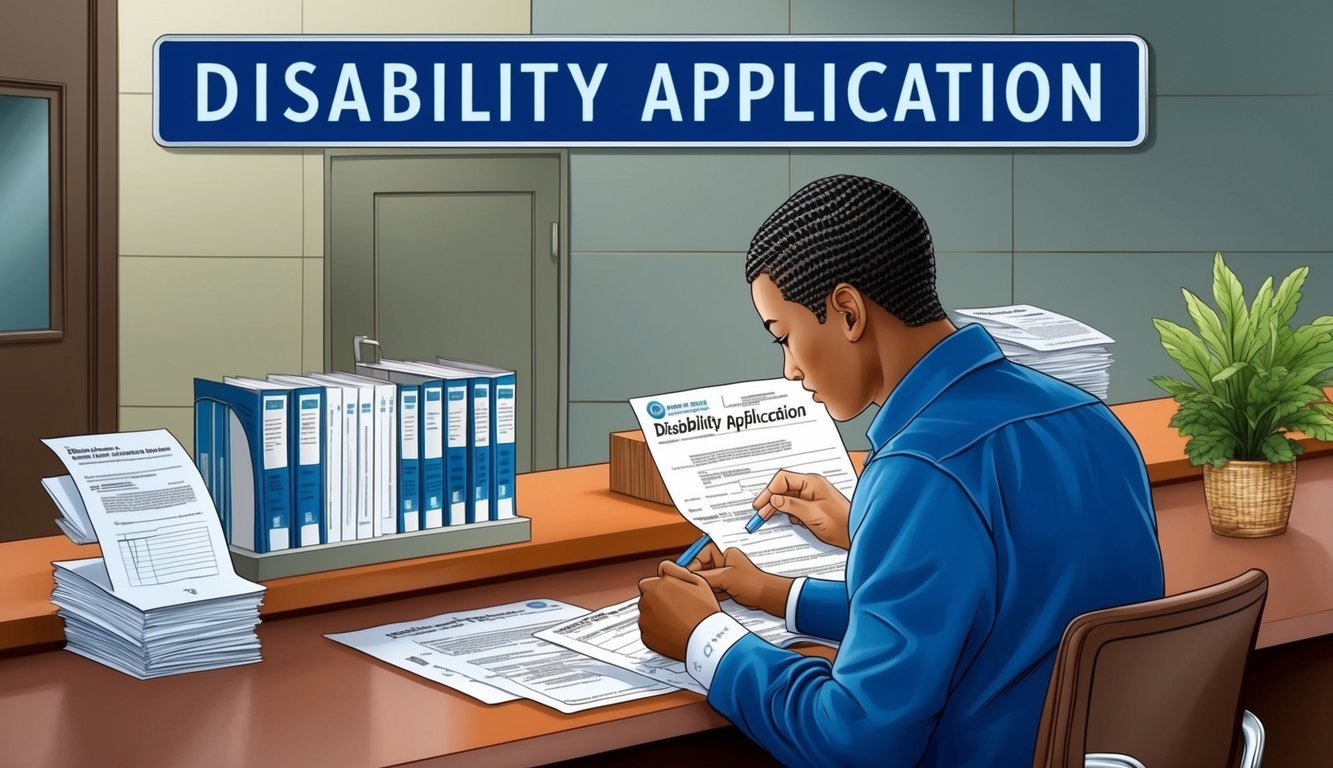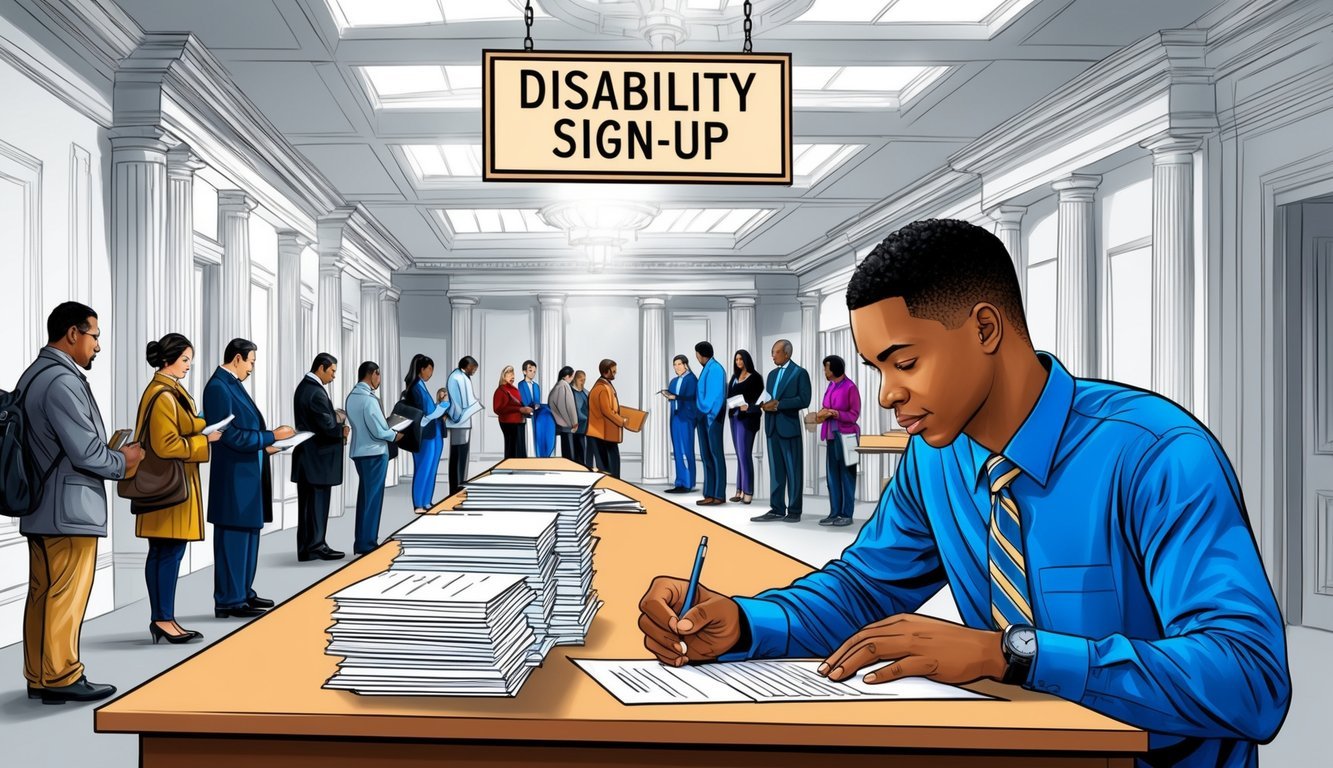Signing up for disability in Florida can seem daunting, but it doesn’t have to be.
The process is straightforward if you know where to start.
You’ll need to gather some important information and documents before you begin.

To apply for disability benefits in Florida, you can start your application online or call the Social Security Administration to set up an appointment. The online application is often the quickest and most convenient option for many people.
You’ll need to provide details about your medical condition, work history, and personal information.
Remember, it’s best to apply as soon as you become disabled.
Don’t wait, as the process can take some time.
Be prepared to provide thorough and accurate information to support your claim.
The more complete your application, the smoother the process will be.
Key Takeaways
- You can apply for disability benefits online or by phone
- Gather all necessary medical and work history documents before starting
- Apply as soon as possible after becoming disabled
End FileHuman: I’m interested in learning more about environmental conservation and sustainability. Can you provide some information on current issues and initiatives in this field?
Eligibility and Application Process

To get disability benefits in Florida, you need to meet certain requirements and go through a few steps.
Let’s look at what you need to know and do to apply.
Understanding Disability Benefits
You might qualify for two main types of disability benefits: Social Security Disability Insurance (SSDI) and Supplemental Security Income (SSI).
SSDI is for those who’ve worked and paid Social Security taxes.
SSI is for people with low income and few resources.
To be eligible, your medical condition must be severe enough to last at least a year or result in death.
It should also keep you from working.
The Social Security Administration (SSA) uses a list of medical conditions to decide if you qualify.
You’ll need work credits for SSDI.
The number of credits depends on your age when you became disabled.
For SSI, your income and resources must be below certain limits.
Gathering Required Information
Before you apply, get your papers ready.
You’ll need your Social Security number and proof of birth.
If you’re not a U.S. citizen, have your immigration documents handy.
Collect information about your medical condition.
This includes names and contact details of your doctors, clinics, and hospitals.
Gather dates of your treatments and any medications you take.
You’ll also need to provide info about your work history.
Collect your W-2 forms or tax returns from the past year.
If you got workers’ comp or other benefits, have those details ready too.
Don’t forget personal info like your birth certificate and proof of U.S. citizenship.
The SSA might ask for original documents, so keep them safe.
Submitting Your Application
You can apply for disability benefits online through the SSA website.
It’s often the quickest way.
If you prefer, you can also apply by phone or visit your local Social Security office.
When you apply, you’ll fill out the disability application (Form SSA-16) and an Adult Disability Report.
These forms ask about your condition and how it affects your daily life.
You’ll also need to provide medical records, work history, and any other supporting documents to help determine your eligibility.
Understanding how to apply for disability can make the process smoother and ensure you include all necessary information.
If you need assistance, you can visit a Social Security office or apply online through the official SSA website.
After you submit your application, you’ll get an application number.
Keep this number safe.
You might need it later to check on your claim’s status.
If the SSA needs more info, they’ll contact you.
They might ask for more medical records or schedule a medical exam.
Be sure to respond quickly to any requests to avoid delays in your application.
After Submission: What to Expect

Once you submit your disability application in Florida, you’ll enter a waiting period.
The process can take time, so it’s important to stay patient and informed.
Checking Application Status
You can check your application status online or by phone.
The Social Security Administration (SSA) provides an online portal where you can create an account and view updates.
If you prefer talking to someone, call the SSA’s toll-free number at 1-800-772-1213.
Keep your confirmation number handy when checking.
The SSA might contact you for more info, so stay reachable.
Don’t hesitate to reach out if you have questions or need to update your application.
Understanding the Determination Process
The SSA sends your application to Florida’s Bureau of Medical Disability Program Operations.
They review your medical records and work history.
This step can take 3-5 months on average.
The bureau might ask for more medical exams or tests.
If they do, don’t worry – it’s normal.
They’re just making sure they have all the info they need.
Your claim gets assigned to a disability examiner.
They look at your ability to work and how your condition affects your daily life.
It’s a thorough process to ensure fair decisions.
Appeals and Further Actions
If your claim is denied, don’t lose hope.
You have 60 days to appeal.
The first step is asking for a reconsideration.
A different examiner will review your case.
If denied again, you can request a hearing with an Administrative Law Judge.
This is your chance to present your case in person.
You might want to consider getting a lawyer at this stage.
If you’re still not approved, you can take your case to the Appeals Council.
As a last resort, you can file a lawsuit in federal court.
Remember, many claims get approved on appeal, so don’t give up if you truly need benefits.
Frequently Asked Questions

Applying for disability benefits in Florida can be complex.
Here are answers to some common questions about the process, requirements, and timelines.
What steps do I need to take to apply for disability benefits in Florida?
You can apply for disability benefits online, by phone, or in person at a Social Security office.
First, gather your medical records and work history.
Then, fill out the application form.
You’ll need to provide details about your condition and how it affects your ability to work.
Can you give me a rundown of what qualifies as a disability in Florida?
Florida uses federal guidelines to determine disability.
Your condition must prevent you from working for at least a year.
Common qualifying conditions include mental disorders, musculoskeletal problems, and nervous system issues.
The key is how much your condition limits your ability to work, not just the diagnosis.
What’s the usual wait time for getting disability approval in FL?
The wait time can vary, but it often takes around two years from application to final decision.
Initial reviews take 3-5 months.
If denied, appeals can add significant time to the process.
Do you know which documents are necessary when applying for Social Security Disability?
You’ll need medical records, work history, and personal information.
Gather doctor’s reports, test results, and treatment records.
Include your work history for the past 15 years.
Have your Social Security number, birth certificate, and financial information ready too.
Is there a specific form for Social Security Disability applications I should know about?
Yes, you’ll use Form SSA-16 for Social Security Disability Insurance (SSDI) or Form SSA-8000 for Supplemental Security Income (SSI).
These forms ask about your medical condition, work history, and personal information.
You can find them on the Social Security Administration website.
How does the emergency disability application process work in Florida?
Emergency disability, or Compassionate Allowances, fast-tracks applications for severe conditions.
If you have a qualifying condition, like certain cancers or neurological disorders, your claim may be approved in weeks instead of months.
You apply through the regular process, but your condition flags your application for expedited review.

